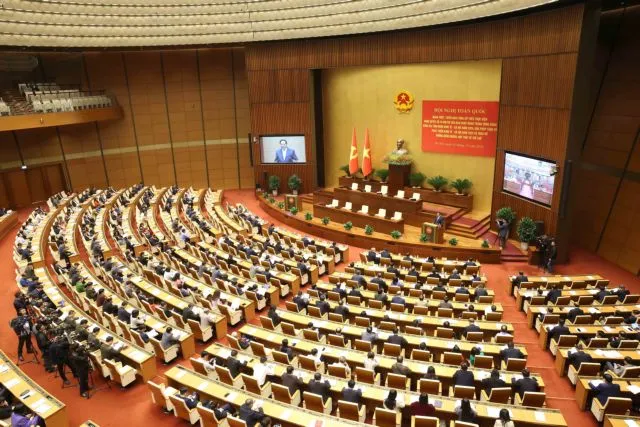
Enhancing the Effectiveness of State Operations
The need for administrative reform was first recognized during the 6th National Party Congress in 1986, coinciding with the Đổi Mới (Renovation) policy. This policy marked Vietnam's transition from a centrally planned economy to a market-oriented one. From the outset, the Party understood that economic reform had to be accompanied by administrative reform.
Key areas identified for reform included administrative institutions, the bureaucratic apparatus, and the civil service. The Party’s resolutions outlined core issues for simplification, such as reducing bureaucratic red tape in business, investment, land management, household registration, immigration, and import/export procedures. These reforms were first implemented in 1994, targeting areas directly impacting businesses and citizens.
Since then, Vietnam has launched three comprehensive State administrative reform programs spanning the periods 2001–2010, 2011–2020, and 2021–2030. Alongside these programs, the Party has introduced numerous resolutions aimed at restructuring the political system to ensure it is both streamlined and effective.
Despite these efforts, the results have fallen short of expectations. Administrative procedures remain cumbersome and overlapping, and the effectiveness of the apparatus is still lacking. This outcome reflects a disconnect between reform objectives and implementation.
One significant barrier to effective reform is the inadequacy of previous implementation strategies. The reforms often lacked a systematic approach, resulting in piecemeal changes rather than comprehensive overhauls. Structural inefficiencies persist, with overlapping roles and responsibilities across different levels of the apparatus.
Reform measures have typically focused on reducing staff in specific problematic areas rather than addressing broader organizational inefficiencies. This fragmented approach has limited the impact of reform efforts, leaving the system as a whole burdened by inefficiencies.
Allocating Resources for Development
Currently, approximately 70% of the state budget is allocated to recurrent expenditures, primarily to sustain the administrative apparatus. This leaves limited resources for public investment in critical sectors such as infrastructure, education, healthcare, security, and national defense.
General Secretary To Lam aptly described this issue as the “bottleneck of bottlenecks.” Without addressing the inefficiencies of the administrative apparatus, there will be little fiscal space to drive Vietnam's economic and social development.
The need for a comprehensive reform of the administrative apparatus is urgent. This reform must be thorough and extend across the Party system, the State system, and socio-political organizations such as the Fatherland Front.
For reform to succeed, it must address both “soft” and “hard” aspects. The "soft" aspect involves a reform mindset, emphasizing political will and scientifically grounded leadership. The "hard" aspect focuses on restructuring and streamlining the apparatus to eliminate redundancies and improve operational efficiency.
A crucial change in strategy is the adoption of a top-down approach to reform. Past bottom-up approaches, where changes were initiated at lower levels and moved upwards, have proven ineffective. A top-down strategy ensures consistent implementation and oversight across all levels of governance.
A well-functioning society operates under the rule of law, which requires a clear delineation of roles between the state and its citizens. The state should focus on governance, regulation, social supervision, and tax collection. Citizens, meanwhile, are free to engage in activities not explicitly prohibited by law. The state should only intervene in areas where citizens are unable or unwilling to act.
Given Vietnam’s unique political structure, where the Party exercises comprehensive and absolute leadership, it is essential to define the Party's role clearly. The Party should lead the state through policy direction and oversight but should not perform state functions. Similarly, the National Assembly should focus on legislative work, leaving executive responsibilities to the government. Mass organizations should focus on their respective missions, without duplicating government functions.
As General Secretary To Lam noted, cadres within the political system must “play their roles and know their lessons,” ensuring clarity and accountability in their functions.
A modern state apparatus must align with the global digital transformation. The Fourth Industrial Revolution and the shift toward a digital economy offer opportunities to improve efficiency and reduce costs. Digitizing the state apparatus can enhance service delivery, streamline operations, and reduce the reliance on human resources.
This time, the Party has reaffirmed its commitment to institutional and administrative reform, emphasizing practical and decisive measures. By embracing digitalization, Vietnam aims to build a modern administrative apparatus capable of meeting the demands of a digital economy.
The reform of Vietnam’s administrative apparatus is not just a bureaucratic necessity but a cornerstone for sustainable development. A streamlined, efficient, and effective system will free up resources for public investment, creating a solid foundation for economic and social progress.
By adopting a comprehensive and systematic approach, Vietnam can ensure that its state apparatus is not only modern and efficient but also capable of meeting the evolving needs of its people and businesses. This reform effort promises to create new momentum for national development, driving Vietnam toward a more prosperous future.
(*) Former Member of the Central Theoretical Council, Former Director of the Institute of Politics, Ho Chi Minh National Academy of Politics




















